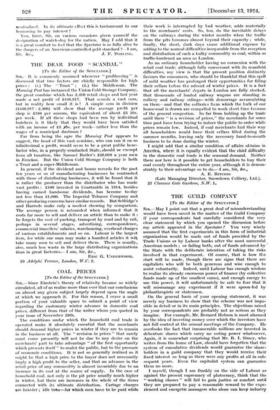. COAL PRICES
[To the Editor of the SPECTATOR.] SIR,—Since Einstein's theory of relativity became so widely circulated, all of us realize more than ever that our conclusions on almost any given subject largely depend upon the angle at which we approach it. For this reason, I crave a small portion of your valuable space to submit a point of view regarding the customary winter advance in domestic coal prices, different from that of the writer whom you quoted in your issue of November 29th.
The conditions undc.r which the household coal trade is operated make it absolutely essential that the merchants should demand higher prices in winter if they are to remain in the business 'at all. The " revision in prices " that surely must come presently will not be -due to any desire on the merchants' part to take advantage " of the first opportunity which presents itself " to mulct the public, but to the pressure of economic conditions. It is not so generally realized as it might be that a high price to the buyer does not necessarily imply a high profit to the seller, and that an advance in the retail price of any commodity is almost invariably due to an increase in its cost at the source of supply. In the case of household coal, not only is the pit price usually much higher in winter, but there are increases in the whole of the items connected with its ultimate distribution. Cartage charges are heavier ; idle time—for which men have to be paid while
their work is interrupted by Lad weather, adds materially' to the merchants' costs. So, too, do the inevitable delays on the railways during the winter months when the traffic from the pits becomes almost beyond their capacity ; while, finally, the short, dark days cause additional expense by adding to the normal difficulties inseparable from the reception and distribution of such a bulky commodity as coal, within so traffic-burdened an area as London.
As an ordinary householder having no connexion with the retail coal trade, although fully conversant with its manifold difficulties, my view is that the present position distinctly favours the consumers, who should be thankful that this spell of mild weather has prolonged their opportunities for filling their cellars before the advent of winter prices. It is a fact' that all the merchants' depots in London are fully stocked, that thousands of loaded railway wagons are standing in colliery and railway sidings—with demurrage accumulating on them—and that the collieries frcm which the bulk of our house-coal is drawn are compelled to work short time because of the general congestion. So far from holding up the trade until there is a revision of prices," the merchants for some time past have been trying to induce the public to order while prices remain low. Indeed, if coal merchants had their way all householders would have their cellars filled during the summer months, leaving only the necessary hand-to-mouth business to be done during the winter.
I might add that a similar condition of affairs obtains in America, where it is equally evident that the chief difficulty in the domestic coal trade is the seasonal demand. Neither there nor here is it possible to get householders to buy their coal evenly throughout the entire year, although it is demon- strably to their advantage so to do.—I am, Sir, &c., A. E. RITCIIIE • (Late Managing Director, Snowdown Colliery, Ltd.). &7 Clarence Gate Gardens, N.W.1.


























































 Previous page
Previous page